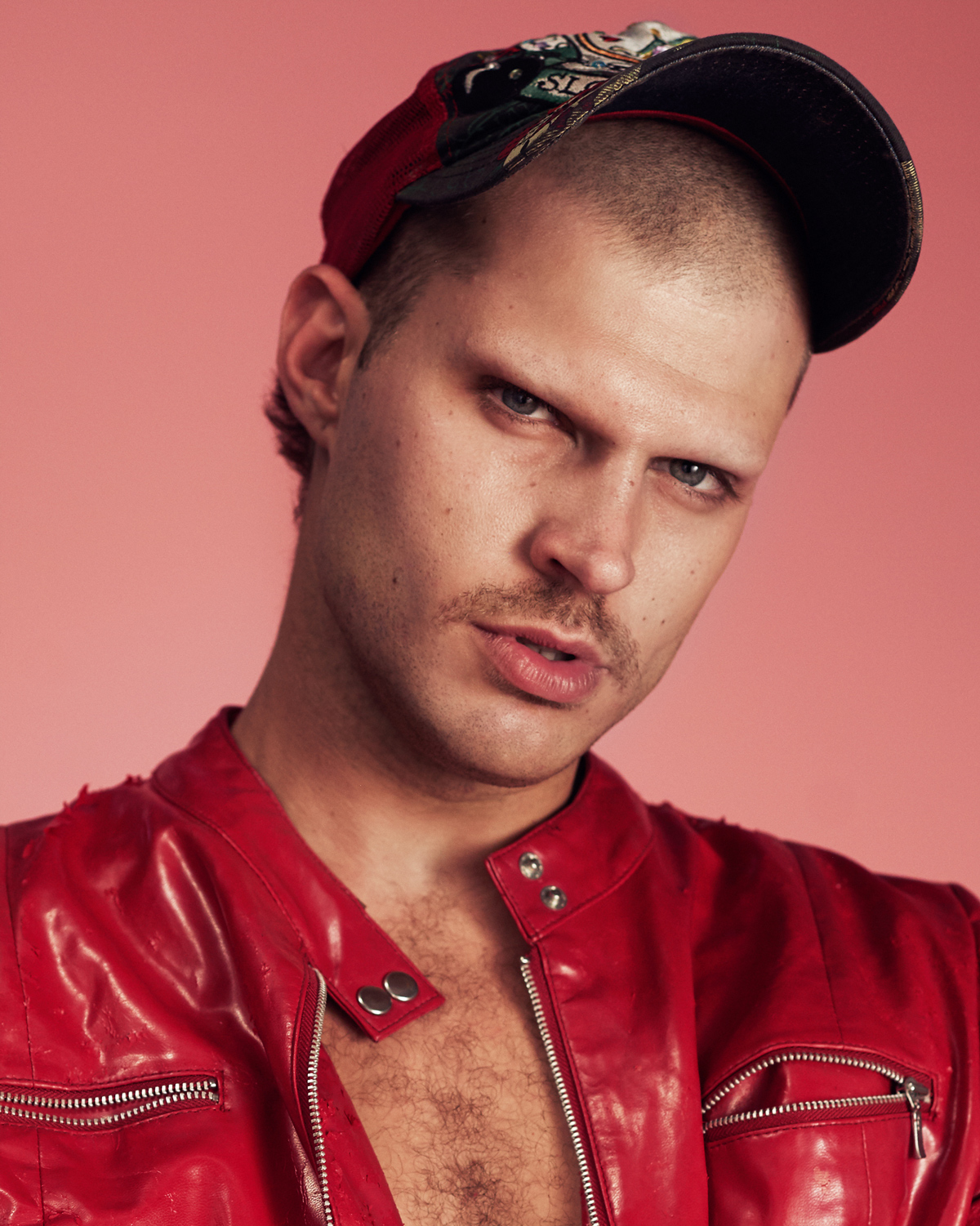When we heard that whip-smart sex worker, activist, and writer Tilly Lawless had joined forces with creative duo (and regular i-D contributors) Charlotte Agnew and Jack Grayson, we knew we were going to be seeing something very special. Together, the trio created a portraits series which offers us a small snapshot of Sydney’s sex work community here and now. Beau Kirq, Jules Kim, Lulu Valentine and Tilly are far more than pretty faces, each offering their unique perspective on the world’s oldest occupation.

Beau Kirq
What does sex work mean to you?
I’m a Jock of all trades, and it certainly is one. The perks are being my own boss, paying myself, plus real moments of lust, comedy, independence, validation, liberation, massage, the occasional tropical getaway to hell, and psychological intrigue. That said, there’s injustice and inequality that afflicts a sizeable chunk of the industry worldwide. Many places in the world are still trying to punish workers for engaging in one of the oldest, most natural and relevant occupations in history. My relative freedom as a Sydney based male worker is a reminder of the overdue freedoms [deserved] for other workers worldwide.
Do you feel like the queer community is more accepting of sex workers?
2017 may be a better time than ever to be open about sex work, but backlash is nothing new. Queers of Sydney have always had subcultural ties with the sexwork, fetish, bondage and porno scenes. Unlike the mainstream culture we’re accepting, encouraging even. Queer Love.

Lulu Valentine
May I ask about your decision to cover your face?
When I first started working, it was purely because I didn’t want to be identifiable by family, friends, ex-colleagues, acquaintances, non-acquaintances, and everyone in between. Unfortunately, it didn’t stop my identity being compromised. I came from a small place where people love nothing more than a bit of gossip, so eventually most of the people I grew up with, including some family members, found out. Now, the decision to remain faceless is for a number of different reasons; first and foremost to protect the identity and privacy of my loved ones.
My job is my choice, and my choice alone. My family, friends and lovers should not need to suffer the consequence of any stigma or judgement about my work on my behalf. I also think that being recognisable in public may compromise the privacy of some clients who I am seen with in different situations — at restaurants, or theatres, or even simply walking into a hotel lobby. I travel very frequently both for work and pleasure, so the prospect of being excluded from entering some countries based on my occupation is another factor in my anonymity. Lastly, and most unfortunately, I simply wanted to avoid discrimination in menial things. I don’t know what the future holds for me, but I don’t ever want to rule out anything, like working a civilian job, or applying for a rental property. Despite what people believe, my job is part of my identity, but not all of it; for me, it just makes sense to only show what is necessary.
You’ve worked in both brothels and private escorting. What are some of the common misconceptions about these two kinds of work?
I started my sex work career in a brothel with no previous ties in the industry, and no knowledge of anything beyond what I was experiencing. I worked for just over a year in different brothels and massage parlours around the country, before making the change to work independently, which I’ve done for the past two years. There are endless misconceptions about both that are perpetuated by people inside and outside of the industry, and unfortunately these play into the “whorearchy”, or, the lateral discrimination against people in different areas of sex work. There is this strange idea that a whore’s dollar is worth more if it is paid to a sugar baby, or so-called “high-class” escort, than it is to a person working in a brothel, or to a street-based worker. I’ve worked for massage parlours which charge $260 for an hour, and I’ve worked independently for $600 an hour, and I can tell you first hand that my working experiences on all ends of this scale mostly the same. The clients are often the same, the workers are often the same, and lo-and-behold, the colour of my cash is just as green.
There is an elitist idea that a sex worker with a pair of Louboutins and a Prada bag somehow avoids the harsh criticisms of sex workers without these tokens. We are all the same — in fact, many of us have worked in all parts of the industry, and will continue to move throughout it during the course of our careers, depending on what is suitable for us at the time. If tomorrow I decide that I want to migrate back to a parlour, nothing about me changes, so I find it hard to understand why I should be treated differently. Also, to quell the rumour — the idea that independent escorting consists only of lavish gifts, fancy dinners, international travel and rich business men, isn’t true. That’s only one small facet, and to ignore the not-so-glamorous side is to ignore how laborious, both physically and emotionally, the job really is. It doesn’t help dispel misconceptions and elitism within our field either.

Jules Kim
As a long time activist for sex worker’s rights, have you noticed any changes — be they drastic or gradual — to activism in the last few decades?
In some ways, a lot has changed and in many others not at all. The Scarlet Alliance is a grassroots, sex worker-led movement, so has to be responsive to the changing needs of sex workers. The biggest change has been technology: mobile phones, the internet and social media really shifted the ways we work — yes, I’m old enough to remember times before then! It’s been important for our activism, because we can control our own messaging and show the diversity of our experiences through a different lens. It’s made the sex work community a lot more accessible, which helped us challenge unhelpful notions of a ‘hierarchy of sex work’ and embrace intersections within our community. I guess it’s also helped that more people are less uptight about sex and sexuality these days.
Sadly, we’re still continuing to fight for our right to bodily autonomy and respect from a system where laws and policies actively deny us our rights and discriminate against us. Sometimes it can feel like groundhog day, but it’s too important to give up. We’re still fighting for the full decriminalisation of sex work as we have for decades. The good news is that evidence and support is mounting: international agencies such as Amnesty international, the World Health Organisation, the international Labour organisation and the United Nations have joined us in recent years to call for the full decriminalisation of our work, workplaces, and third parties for sex worker’s rights, health and safety.
Before you became the CEO of Scarlet Alliance, you were the manager of the Migrant Sex Worker Project. What are the most common misconceptions about migrant women and Asian women as sex workers?
Wow, there’s so many! There’s so many pervasive stereotypes we are literally bombarded with. These inherently racist, sexist, xenophobic and whorephobic ideas of migrant sex worker are so dominant: it’s very easy for people to believe the concept of ‘trafficked sex slaves’ or ‘the submissive Asian sex worker without agency’ unless they actually meet and speak with us. I’m not saying trafficking doesn’t exist, but it certainly isn’t the dominant experience for the vast majority of migrant sex workers. Unfortunately, anti-trafficking policies have been used to persecute and criminalise migrant sex workers. Anti-sex work organisations have also used the anti-trafficking discourse to legitimise their calls to abolish sex work and criminalise all sex workers, supposedly for our own good. It’s seems any violations of our rights is acceptable if it’s packaged as “for your own good!”
What do you find is the most interesting tidbit of sex worker rights history?
We celebrate International Whore’s Day on the second of June in memory of the sex workers who staged a sit-in protest in a church in Lyon, France. It was in 1975, they were protesting against the inaction of police following the murders of sex workers. When police raided the church to arrest the protesters, locals joined to sit alongside the sex workers in solidarity, so police couldn’t work out who to arrest. That moment is widely accredited as the birthplace of the modern sex worker rights movement. That said, there’s so many great and sometimes hilarious anecdotes it’s hard to pick one. I guess what I am most struck by is the continuing bravery of amazing sex workers who often, at great personal cost, continue to stand up and speak out.

Tilly Lawless
Does the increasing visibility of sex workers in the media bode well for your rights?
It’s a double edged sword. The rising fascination with sex workers could be compared to the ‘lesbian chic’ of the 90s. The Vanity Fair KD Lang and Cindy Crawford cover certainly threw lesbians into the limelight, but it didn’t actually make them more accepted or respected. It just glamourised them, turned them into an edgy tool in fashion for decades to come. I see the same thing happening with sex work now. People are so ready to consume stripper and sex work culture: Magic Mike XXL, the main characters of Moulin Rouge and Breakfast at Tiffany’s, the popularity of stripper heels. But no one actually gives a fuck about our rights. We’re good enough for consumption, but not for respect. This is why it’s so important to me to have a voice alongside all images of sex workers, so we don’t just become another trope, so there’s a continued push for our rights.
How do you deal with burning out at work?
Burn out is the worst, and it’s hard to find a space to talk about it without your words being used against you. People in other jobs are given space to heal, but I’m just told to quit when I talk about being emotionally exhausted. Time off is really the only thing that helps, but you’re not always in a financial situation to do that. I find when I’m burnt out, cutting down on social engagements is important, as is spending time with less demanding clients. Often, that means no regulars as they tend to want more from you. Just being easy on myself is important too: accepting that I am burnt out and that I am going to make less money for a while, and that that is okay.
Credits
Photography Jack Grayson
Art Director Charlotte Agnew
Hair Stavros Georgoulas
Makeup Claire Thomson
Assistant Shakirra Mae
